In this article, I will discuss the best hosting solutions for Django by pointing out their differentiating features.
Ease of deployment, scalability, performance, and cost are some factors we will use to evaluate the platforms.
These critical areas will help you know the most suitable host for your Django application to ensure it performs well and can be managed easily.
Key Points & Best Hosting For Django List
| Platform | Key Points |
|---|---|
| Azure | Advanced AI and machine learning capabilities, robust data analytics tools, global network infrastructure. |
| Google Cloud Platform | Cost-effective dedicated servers, high-performance hardware, and customizable configurations. |
| Hetzner | Easy deployment and scaling of applications, strong support for multiple programming languages, and managed services. |
| DigitalOcean | Easy deployment and scaling of applications, strong support for multiple programming languages, and managed services. |
| Heroku | Easy deployment and scaling of applications, strong support for multiple programming languages, managed services. |
5 Best Hostings For Django
1. Azure
Azure is the most suitable option for hosting Django applications because it strongly supports Python frameworks and provides cloud services.
Azure App Service makes deploying Django apps easy as it can scale and manage resources automatically.
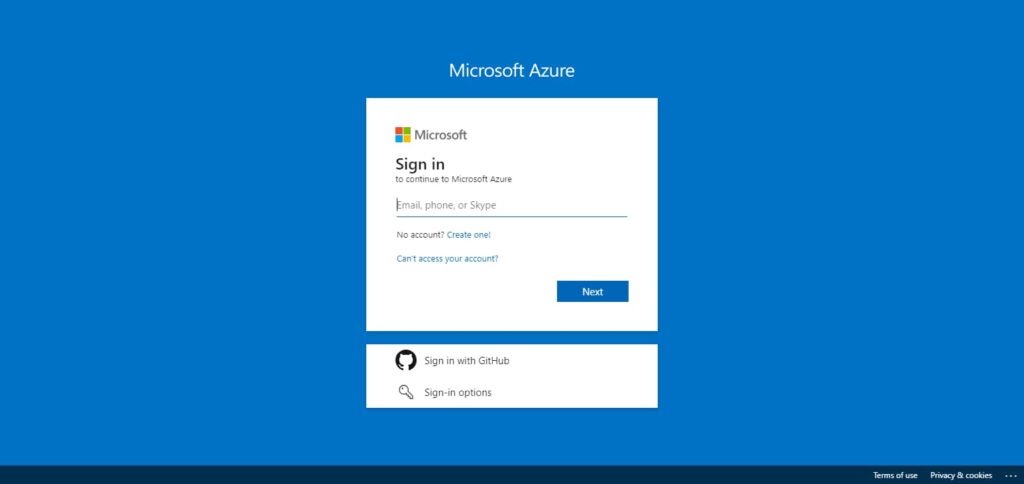
This service works well with Azure Database for PostgreSQL or MySQL, thus simplifying database setup and management for Django apps.
Moreover, Azure integrates with Visual Studio and Azure DevOps, speeding up development and deployment processes. At the same time, its worldwide network guarantees users minimum response time due to high availability from anywhere globally.
With automatic scaling monitoring and security features, Azure ensures the reliability and scalability of the environment where Django applications are executed.
Pros:
- Offers broad integration with Microsoft tools and services.
- Comes with advanced AI and machine learning features.
- Has numerous data centers around the world for better availability.
- Provides robust security and compliance capabilities.
- It supports a hybrid cloud environment through easy on-premises integration.
Cons:
- It can be challenging to navigate or manage because so many different services are available.
- It takes longer for beginners to learn than simpler platforms do.
- Some configurations or services may cost more than others might.
- A few people have experienced occasional performance problems.
- An extra setup may be needed to integrate it with non-Microsoft tools.
2. Google Cloud Platform
Among its flexible cloud services, the Google Cloud Platform (GCP) offers a firm setting for hosting Django applications.
Developers can deploy Django apps quickly using Google App Engine, which has automatic scaling and managed infrastructure.
One can use customizable virtual machines through Google Compute Engine for more power over things, while Google Kubernetes Engine provides options for deploying containers.
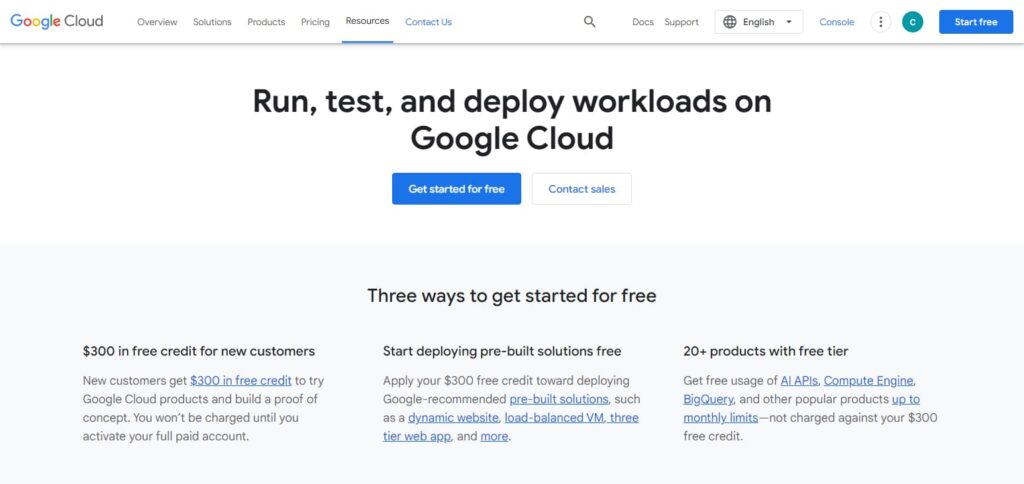
Integration with Cloud SQL allows GCP to manage databases that support PostgreSQL, MySQL, and SQL Server, which then seamlessly integrates with Django.
Additionally, CI/CD pipelines are made more efficient by GCP’s Cloud Build and Cloud Source Repositories, where development is done faster.
The vast network provides anThelability, this unsuitability I performance and scalability of any Django application on the Google Cloud Platform.
Pros :
- It has advanced data analytics and machine learning tools.
- It is firmly integrated with open-source technologies and Kubernetes.
- Free tier usage is generous, and sustained use discounts are offered.
- Networking performance is high with low-latency connections.
- The interface is user-friendly, and command-line tools are powerful.
Cons:
- Beginners to cloud platforms may find it challenging to learn.
- Billing models and pricing can be intricate and unpredictable.
- It may not support some enterprise applications well enough.
- Support responds slowly for some of their customers.
- There might not be full regional availability in all areas.
3. Hetzner
Hetzner is a good option for Django hosting, especially if you want inexpensive but dependable services.
Virtual private servers (VPS) and dedicated servers are offered by Hetzner, which are flexible and resourceful enough to run Django apps efficiently.
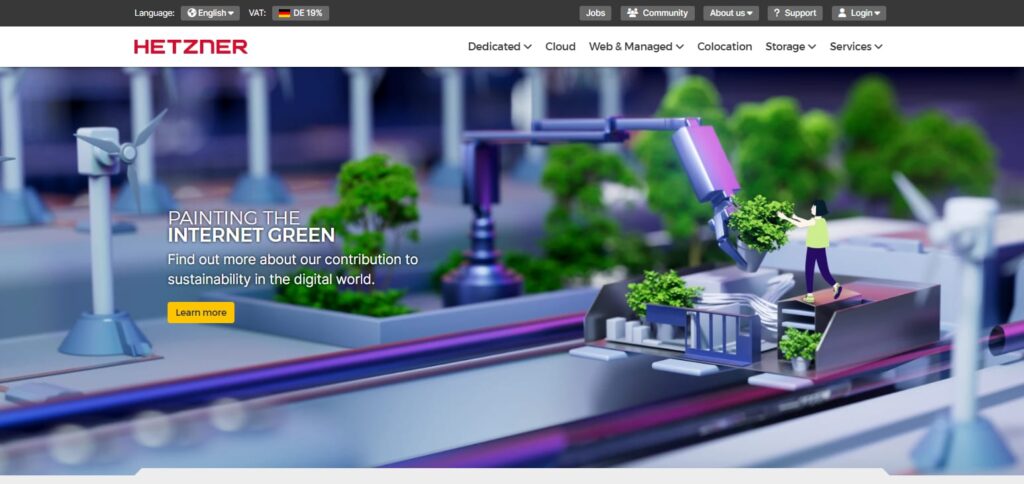
Although managed Django hosting is not available from Hetzner, it does support many Linux distributions and can be easily set up to satisfy Django’s requirements.
The platform also gives block and object storage options that can be used to manage static and media files in your Django application.
Furthermore, Hetzner boasts of an uncomplicated pricing system coupled with vital data centres in Europe, ensuring good performance at a fair cost for all your hosting needs.
Pros:
- The price of VPS and dedicated servers is competitive.
- It also provides customizable high-performance hardware.
- They have a management interface that is easy to follow and user-friendly.
- Data centres in Germany and Finland provide good value for European customers.
- Solid customer support with reliable uptime.
Cons:
- Managed services are fewer than larger cloud providers offer.
- Global data centre locations are fewer, which may increase latency for non-European users.
- It does not have some advanced cloud features and integrations.
- They and DevOps tools do not sufficiently support high-level automation.
- More manual setup and maintenance may be necessary for complex configurations.
4. DigitalOcean
Regarding Django app hosting, DigitalOcean is among the best alternatives because it is easy to use and can be expanded.
If you want to deploy your Django app quickly, Droplets from DigitalOcean will help you do that on a customizable virtual private server.
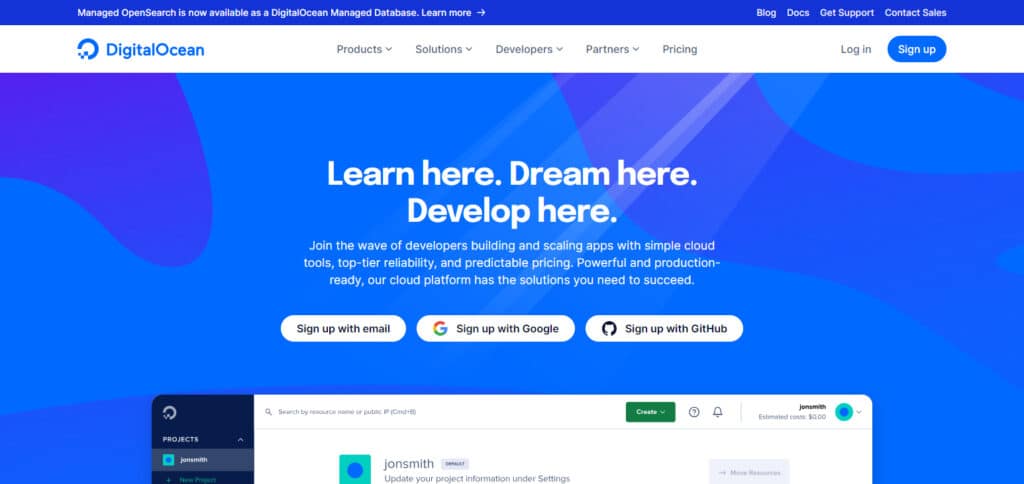
Moreover, deployment becomes even more straightforward with the App Platform service, which provides a platform as a service (PaaS) environment that automatically takes care of scaling and management for you.
DigitalOcean works well with managed databases, too; for example, PostgreSQL, which is often used alongside Django.
What makes this provider great is its affordable pricing model coupled with an intuitive interface suitable for beginners in programming and experienced ones – not forgetting about their worldwide data centres offering high availability across different regions while keeping latency at minimum levels for all hosted apps.
Pros:
- Simple deployment using a user-friendly control panel.
- Billing transparency with affordable prices.
- Fast allocation and scaling of resources.
- Helpful community and comprehensive documentation.
- Good support for Kubernetes and containerized apps.
Cons:
- It has fewer advanced networking features compared to other big cloud providers.
- Fewer managed services options for databases and infrastructures.
- Performance may vary based on allocated resources.
- It doesn’t have native support for hybrid clouds.
- It is not as enterprise-focused and has fewer compliance certifications.
5. Heroku
Due to its simplicity and friendly developer environment, Heroku is a shared host for Django applications.
Their platform as a service (PaaS) model allows easy deployment and scaling of Django apps with fewer configurations.
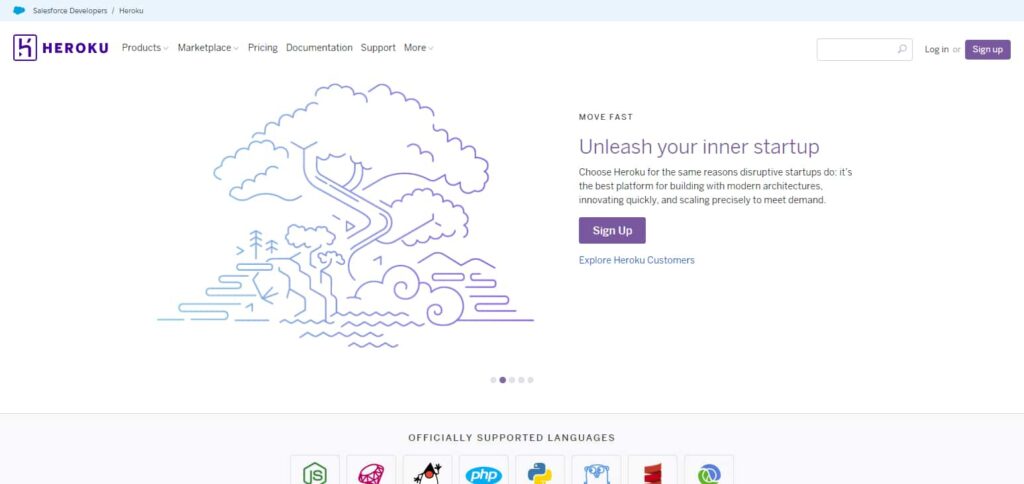
Developers can use git for quick deployment. At the same time, the add-ons marketplace of Heroku pHerokus managed services for databases like PostgreSQL and other integrations necessary for Django adjunctions.
The platform automatically handles scaling, monitoring, and maintenance, freeing developers from infrastructure concerns.
In addition to being simple, their pricing model is transparent and supports continuous integration and delivery (CI/CD), making it suitable for small projects or large-scale applications.
Pros:
- The deployment process is made more efficient by using Git integration.
- Integration with services is easy due to the availability of many add-ons.
- The platform takes care of scaling and load balancing automatically.
- Multiple programming languages and frameworks are supported.
- There is a user-friendly interface for managing applications.
Cons:
- It can be costly when application usage increases.
- Control over underlying infrastructure and configurations is limited.
- During periods of high traffic, performance problems may occur.
- Customizability might be limited compared to other platforms.
- Deploying larger applications with many dependencies can take longer.
What should you look for in the best hosting for Django?
When you are choosing the best hosting for Django, you should consider these factors:
Ease of Deployment
Look for a straightforward process of deploying Django on platforms. The ideal situation is built-in support for Django applications.
Scalability
Hosting services need a system that automatically adjusts to growth and increases traffic with more resources.
Database Support
Ensure that it supports databases recognized by Django, like PostgreSQL or MySQL, and think about managed database solutions that make maintenance easier.
Performance and Speed
Consider hosts who promise fast loading times coupled with stable performances characterized by low server latency and quick responses from nearby servers.
Security Features
SSL certificates should be one of many security precautions providers take towards safeguarding apps’ data integrity besides making backups regularly and implementing firewalls–all these features matter when choosing where to host your app securely!
Support & Documentation
It must have strong troubleshooting support inadequate up by detailed documentation on optimizingDjangojango app.
Costs & Pricing Structure
Always consider the cost of hosting services vis-à-vis your budget; scaling fees or any other feature-related charges may apply in addition to this base price tag.
Compliance & Uptime
Check for guarantees concerning uninterrupted service provision (uptime) and conformity with applicable privacy and data protection laws.
Conclusion
Choosing the most suitable hosting for Django depends on what you want. For easy and quick deployment, Heroku provides simplicity and robust add-ons configured with minimum effort, which is great for developers who wish to do less work.
Flexibility and scalability are offered by DigitalOcean as well as Azure, which concentrates on simpandecost-effectivenesstivenes. Azure also provides many integrations with Microsoft services plus advanced features.
Google Cloud Platform has excellent tools for robust analysis and machine learning. At the same time, Hetzner uses a cheap pricing strategy alongside high-performance hardware, even though it may need more manual setup.
Last but not least, one should choose between these options, considering deployment ease, scalability, performance, and cost, depending on the project’s needs.








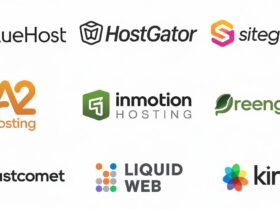
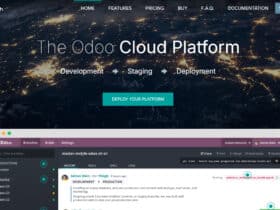



Leave a Reply